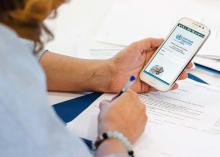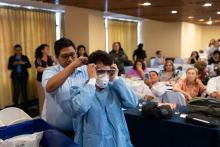The United Nations Department of Global Communications (DGC) promotes global awareness and understanding of the work of the United Nations.
Protecting human rights amid COVID-19 crisis
As concerns grow about how the coronavirus crisis might threaten human rights around the world, the United Nations is calling on countries to adopt a more cooperative, global and human rights-based approach to the pandemic.
UN repeats call for ceasefire as it works to save Middle East from COVID-19
With the coronavirus pandemic threatening further suffering in countries already experiencing conflict in the Middle East, the United Nations is working to stop COVID-19 from taking hold in the war-ravaged region, where humanitarian needs are already enormous.
UN mobilizes global cooperation in science-based COVID-19 responses
From leading research and development to assess potential treatments for #COVID19, to supporting the deployment of medical robots in China, the United Nations is mobilizing international cooperation to harness the power of science, technology and innovation to tackle the coronavirus pandemic.
“I’m behind you,” Secretary-General tells UN health workers fighting COVID-19
As the world tackles the COVID-19 pandemic, the United Nations is strengthening its preparedness and capacity to address the spread of coronavirus within its own workforce to ensure the Organization can continue delivering on its life-saving mandate around the world.
Gender equality in the time of COVID-19
Whether at home or as first responders, women are on the frontlines of the coronavirus response around the world. Representing 70 per cent of the global healthcare workforce, women are key to the COVID-19 response. At the same time, many women are taking on additional duties at home, including increased childcare and home-schooling responsibilities. There is also evidence that women and girls are experiencing higher levels of domestic violence in the wake of the pandemic. The United Nations is working to draw attention to the unique needs of women and the continued importance of a balanced gender perspective amid the crisis.
UN joins forces with new partners to share vital information about coronavirus
From teaming up with some of the world’s best-known football stars and popular local musicians, to launching a direct messaging campaign with Whatsapp, the United Nations is joining forces with new partners to share vital information about coronavirus. “We have to use all possible ways to carry the message of hope and safety,” says the United Nations Resident Coordinator in Costa Rica.
UN supports Latin American countries in urgent effort to stop COVID-19 spread
With coronavirus transmission on the rise in most Latin American countries, there is a small window of opportunity for Governments to slow the spread of the virus, reduce the impact on health systems and save lives, the United Nations’ specialized health agency in the region has warned, calling for urgent action. "This pandemic is serious, and we need to do everything in our power to mitigate the impact of COVID-19 on our people,” says Carissa F. Etienne, Pan American Health Organization (PAHO) Director.
UN tackles ‘infodemic’ of misinformation and cybercrime in COVID-19 crisis
From selling fake coronavirus cures online to a cyberattack on hospitals’ critical information systems, criminals are exploiting the COVID-19 crisis, the United Nations has warned, as it also steps up its fight against a proliferation of false information about the virus. “We’re not just fighting an epidemic; we’re fighting an infodemic,” said Tedros Adhanom Ghebreyesus of WHO.
Defending Africa from COVID-19; UN and Governments brace for virus spread
As the coronavirus (COVID-19) has swept through Asia, Europe and North America, medical experts are warning that it is just a matter of time before Africa would see an exponential increase in cases. The United Nations is rushing to protect Africa from the COVID-19 onslaught that would lead to massive losses of lives and unprecedented social and economic damage.
The United Nations supports frontline COVID-19 response
With the coronavirus pandemic extending to some of the world’s poorest countries, the United Nations is in a race against time to help prevent the further spread of COVID-19. UN country teams are redoubling their support for frontline responders and working to help vulnerable countries strengthen their healthcare infrastructure.






























